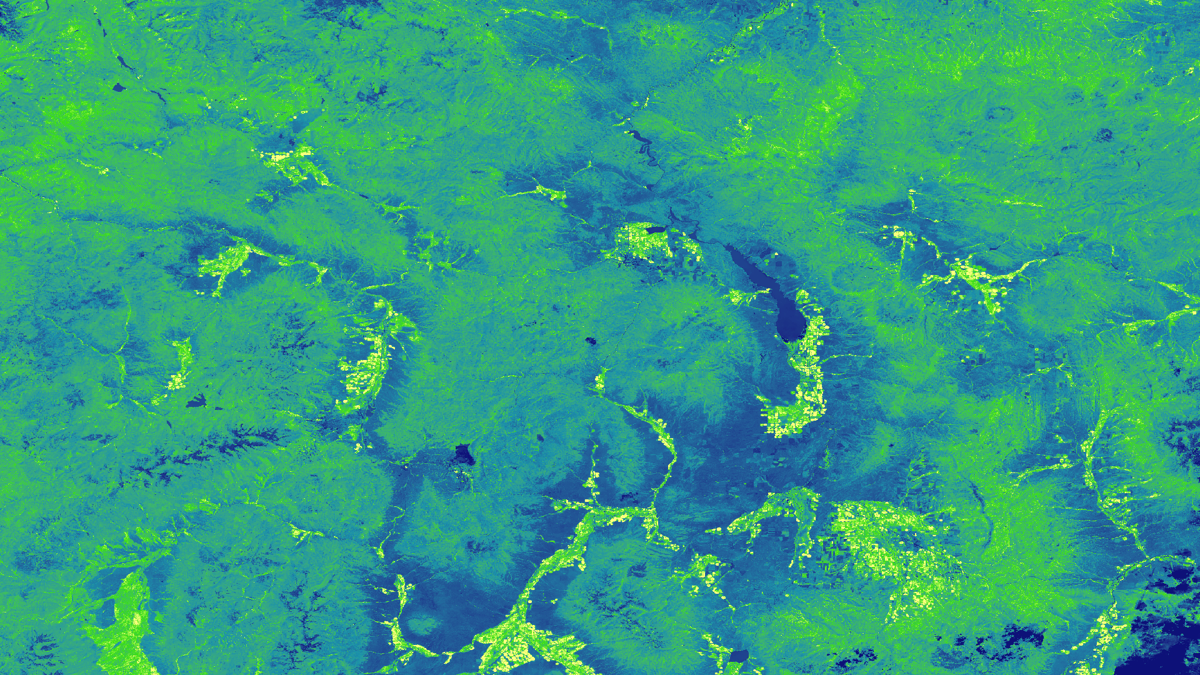
NASA

NASA
Tasseled cap greenness transformation derived from Landsat 8 imagery over lodgepole pine forest in the Intermountain West study area
Completed Projects
Caroline Williams
Team: Robyn Holmes (Project Lead), Christian Bitzas, Jillian Greene, Isabella St. John
Summary: The Willwood Dam, an irrigation diversion dam located on the Shoshone River (Wyoming, USA), has faced ongoing issues with sediment accumulation and needs frequent sediment...
Caroline Williams
Team: Son Do & Jessica Besnier
Summary:
Urban flooding poses as one of the biggest issues for cities today as its impacts are amplified by both climate change and urbanization. The Natural Capital Project’s Integrated Valuation of Ecosystem Services...
Kathryn Caruso
Team: Kristin Anderson (Project Lead), Omeed Arooji, Isabella Chittumuri, Tom Germann
Summary: Alaska is experiencing climate change at an unprecedented rate, with temperatures increasing twice as fast as the national average. The resulting changes to the landscape and ecosystems are...
Brianne Kendall
Team: Kindrea Gibbons (Project Lead), Michaela Gooch, Quinton Deppert, Casey Mills
Summary: A flash drought refers to the rapid onset or intensification of drought-like conditions. Within the Southeastern United States, flash droughts are made worse by the presence of consumptive...
Brianne Kendall
Team: Cassie Ferrante (Project Lead), Katherine Scott, James Karroum, Cate Lull
Summary: The balancing of atmospheric CO2 sources and sinks is fundamental to curbing climate change. Forests draw CO2 from the atmosphere and accumulate carbon in tree biomass and...
Tyler Pantle
Team: Jane Zugarek (Project Lead), Madison Arndt, Jessica Gray, Amelia Untiedt
Summary: Bioindicator species monitoring allows researchers to infer the overall ecological health of a given area. Among these species, the Common Loon (Gavia immer), occupies the land-water interface...
Olivia Landry
Team: Olivia Etherton, Jeanette Moritz, Joshua Stokes, Ephrata Yohannes
Summary: The City of Colorado Springs, situated in Colorado’s Front Range corridor, is grappling with poor air quality exacerbated by intensifying wildfire regimes, fueled by climate change...
Michael Pazmino
Team: Lori Berberian (Project Lead), Kaely Harris, Mitch Porter, Emma Waugh
Summary: Wetland ecosystems are annually or seasonally wet transition zones between land and water. They provide a range of ecosystem services such as water filtration, flood mitigation, and carbon...
Ryan Healey
Team: Preethi Malur Balaji (Project Lead), Talissa Cota, Kangsan Lee, Melissa McNally
Summary: Management Area in Bingham County, Idaho, has an issue with decadent and accumulated vegetation growth encroaching on wetland habitat, which presents challenges for wildlife, decreases biodiversity, and...
Julianne Liu
Team: Thomas Schindelman (Project Lead), Emily Culling, Gianna Méndez Germán, Janna Chapman
Summary: New York City, the most populous city in the United States, is threatened by exacerbated heat exposure due to the urban heat island (UHI)...